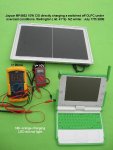Well, you've got no excuese not to buy a multimeter or two now.
http://planet.farnell.com/email/cpc/WebOffers/aug_14clp.htm
Quality unknown, we know where it'll be made. But at least CPC (for UK buyers) are good for warranty. I think P&P a fiver.
So, under a tenner and you don't have to get in your car and drive 50 miles to save a quid.
Too expensive?
http://planet.farnell.com/email/cpc/WebOffers/aug_14clp.htm
Quality unknown, we know where it'll be made. But at least CPC (for UK buyers) are good for warranty. I think P&P a fiver.
So, under a tenner and you don't have to get in your car and drive 50 miles to save a quid.
Too expensive?

